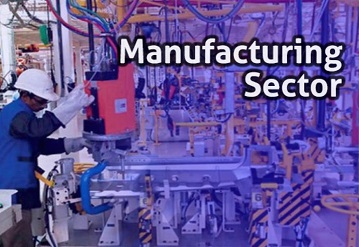Relevance of Manufacturing Sector to Nigeria’s Economic Revival- Mahmud Shuaibu Ringim
By Mahmud Shuaibu Ringim
Farouq Kperogi’s letter from Atlanta on Tinubu, “Nigeria is sinking, and the streets are full of tears,” vividly captures the prevailing national sentiment.
For an extended period, neo-liberal economists have dominated Nigeria’s economic policy landscape, particularly since the introduction of the Structural Adjustment Program (SAP) in 1986 by the Babangida administration.
Prior to SAP, the government held controlling shares in banks and various sectors due to the 1976 indigenization decree. Foreign exchange allocation was managed through import licenses, and multinational companies’ profit repatriation was regulated.
However, the Buhari administration’s tight foreign exchange control suffocated the economy, leading to a counter-trade policy with international partners. This eventually forced Nigeria into accepting IMF conditionalities, including privatization and trade liberalization.

The subsequent economic policies, often attributed to homegrown solutions, were marked by borrowing for infrastructure and raising taxes, causing economic contractions, unemployment, and inflation.
Read Also: Fake Customs CG nabbed over job scam
Advocates of financial liberation and deregulation championed Reaganomics, emphasizing the market’s role, leading to the withdrawal of government from various sectors.
This policy shift disadvantaged the middle and lower-income brackets, resulting in subsidy withdrawals, the repeal of the Foreign Exchange Control Act of 1962, and the closure of industries. The APC government, under Buhari, faced economic challenges, with interventions by the CBN causing exchange rate volatility and a debt overhang.
Tinubu’s administration inherited these economic issues, leading to calls for innovative solutions. While acknowledging the hardship faced by Nigerians, President Tinubu took the bold step of removing subsidies on Petroleum Motor Spirit (PMS) and allowing the foreign exchange to float. However, these decisions had profound economic repercussions, affecting households and businesses.
As the 2027 election cycle approaches, the President must address the current economic hardships to secure voter support. A crucial step would be unlocking the manufacturing sector’s potential by establishing a dedicated Industrial Resuscitation Fund, similar to Tetfund and PTDF. This fund could emulate successful initiatives, like the Refinancing and Restructuring Facility introduced by Muhammadu Sanusi II at the CBN, fostering growth and job creation.
Read Also: How we uncovered $2.4bn fraud in FX claims –CBN
To emulate the prosperity of nations like China and India, the President should prioritize the manufacturing sector. Indigenous investors, exemplified by Dangote and BUA industries, serve as economic ambassadors globally. By providing targeted support and encouragement, the government can propel the manufacturing sector to create employment opportunities for graduates nationwide.
Ringim, HALIM Consulting Ltd can be reached at mahmudshuaibu44@gmail.com



Comments are closed.